Circadian Rhythmicity
Sources:
Circadian rhythmicity, or the circadian rhythm, is a critical biological process that follows a 24-hour cycle responding to light and darkness in an organism's environment. It involves the synchronization of various physiological processes, including sleep patterns, hormone release, body temperature, and other important functions that occur in predictable patterns over a 24-hour period.
Key Insights on Circadian Rhythmicity:
-
Gut Microbiome and Circadian Clock: Dr. Eran Elinav discussed how dietary timing affects the gut microbiome's composition and function, which in turn influences the circadian clock that regulates cellular and organ activities across different body locations. Disrupting this microbial circadian activity, such as by altering eating patterns or through jet lag, can lead to metabolic disorders like obesity and type 2 diabetes 1.
-
Time-Restricted Eating: Rhonda Patrick emphasized that constraining eating within a certain time window (e.g., 8-12 hours) aligns well with our circadian rhythm, potentially protecting against obesity and metabolic diseases. Time-restricted eating positively influences circadian rhythms in peripheral tissues like the liver, affecting overall metabolism 2.
-
Light Exposure and Circadian Health: Exposure to adequate natural light during the day and darkness at night is crucial for maintaining healthy circadian rhythms. Matthew Walker highlighted that daylight helps strengthen the circadian rhythm, promoting alertness and productivity during the day, whereas excessive light at night can disrupt these rhythms and affect sleep quality 3.
-
Shift Work and Health Rispects: Discussing modern societal impacts, Satchin Panda noted the extensive disruption caused by non-traditional work hours, such as shift work, leading to a prevalence of chronic diseases like obesity and diabetes. This shift in natural light exposure patterns has a significant impact on our circadian health 4.
-
Circadian Rhythms in Organ Function: Every organ in the human body, including the liver, kidneys, and heart, operates on a distinct circadian rhythm. This rhythm is crucial for optimal performance and health. Disruptions in circadian rhythms can affect everything from sleep to cognitive function 5.
These insights underline the importance of synchronizing our daily activities, such as eating and sleeping, with natural circadian rhythms to enhance overall health and reduce the risk of chronic diseases.
RELATED QUESTIONS-




